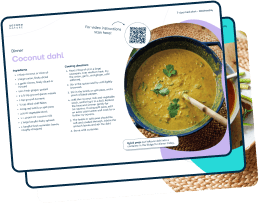Jump to: Three ways to have a more balanced Halloween | Do some home-baking with the whole family | Practice mindful eating | Try and avoid eating sugar on an empty stomach | Take home message
Halloween is a time filled with sweets, sugar, and cakes decorated in pumpkin orange. For many, it’s a time of play and an opportunity to show off their Halloween costumes and spend some time with family or friends.
It can also be a time when people overindulge and feel guilty for ‘falling off the wagon’ of their chosen diet or new weight-loss regime. This often happens because we fall into the trap of all-or-nothing thinking. We identify sugar, cakes, and other baked goods as ‘bad’; therefore, if we eat them, we’re also flawed in some way.
This all-or-nothing approach to food starts a cycle of guilt and shame and likely leads to overindulgence in the same foods we were trying to restrict in the first place.
If this sounds familiar, we’ve got a complete guide on how to build a positive relationship with food here. For now, we’ve put together three practical tips on how to enjoy a healthy, balanced Halloween this year.
Medication-assisted weight loss with a future focus
Start with Wegovy or Mounjaro, transition to habit-based health with our support


Three ways to have a more balanced Halloween
- Do some home baking with the whole family: We’re often very disconnected from the foods we eat, particularly sweets and baked cakes that we buy from a supermarket that’s been mass-produced. Involving the whole family in the process from start to finish could develop a more mindful relationship with the ingredients and how you enjoy the final result. You can find some Second Nature dessert recipes here.
- Practice mindful eating: Mindful eating has been proven to support weight loss and increase food enjoyment; click here for our complete guide on how to eat mindfully.
- Try and avoid eating sugar on an empty stomach: Eating sugar or other refined carbohydrates in isolation can sometimes lead to a dramatic rise and fall in our blood sugars. Low blood sugar levels can leave you feeling sluggish, jittery, and hungry. Either enjoy your sweets and desserts after the main meal or pair sugar with a source of protein if you find yourself enjoying sugar between meals.
At Second Nature, we don’t restrict entire food groups or label any foods as good or bad. We educate you on nutrition science so you can make an informed decision about how to balance your intake to suit your personal goals and preferences.
Join over 150,000 people like Jo, who’ve lost weight, improved their health, and found food freedom with Second Nature. All you’d need to do to start is click here to take our health quiz.
Otherwise, keep reading as we dig deeper into three ways you can enjoy a healthy Halloween this year.
1) Do some home-baking with the whole family
Many of us know the importance of home-cooked meals on health. Preparing our own meals means we can control exactly what goes into our food and the ingredients’ quality.
Research has consistently shown a strong association between the frequency of home-cooked meals and weight. One study found that those who reported cooking meals more than five times a week, compared to less than three times, were 28% less likely to have a high BMI and 24% less likely to have excess body fat.
But it might not be just our cooking habits for main meals such as dinner and lunch that influence our health.
Research on individuals who have successfully achieved weight loss maintenance has suggested a potential link to our approach to home baking. A study compared the lifestyle behaviours of over 6,000 people to investigate what was influencing their ability to maintain weight loss or not.
While many lifestyle factors will influence successful weight loss maintenance, the study showed that those who had successfully lost weight and kept it off were more likely to view baking and home cooking as fun leisure activities.
This research suggests our state of mind and approach to baking could influence whether we overeat these foods or not.
So why not choose some recipes that you and your family will enjoy and bake them together? You might be more likely to appreciate the ingredients you’re using and be able to enjoy the finished product in a more balanced way.
Key points:
- Research has shown that people who cook meals from fresh ingredients are more likely to maintain a healthy weight.
- Research on individuals who’ve achieved weight loss maintenance has shown that they’re more likely to view baking as a fun activity than those who put the weight back on.
- Improving our relationship with baking and the ingredients we use could help us eat these foods in a more balanced way.
2) Practice mindful eating
Mindful eating is inspired by the practice of mindfulness, which is broadly defined as paying attention on purpose and without judgement.
Research has shown that people who eat mindfully and take their time with their food eat less overall, lose weight, and enjoy their food more as they learn to savour the flavours and textures of the food.
We’ve got a complete guide on how to eat mindfully here, but here’s a quick summary of our three ways to eat mindfully:
- Eat without distraction: Turn off your TVs and leave your devices in another room. Whether you can enjoy your dinner at the table or with it on your lap on the sofa, this is an opportunity to pay attention to your meal and savour the different textures and flavours.
- Take your time: Try the 20-20 strategy. Take 20 seconds to chew every mouthful and 20 minutes for the whole meal. You could also start your meal with three deep breaths to put you in a state of calm beforehand.
- Eat until you’re comfortably full: If you always eat until you’re bursting at the seams, you’ve probably eaten more than you need from that meal. Find our hunger scale here to learn to listen to your natural hunger cues.
Key points:
- Research has shown mindful eating to be an effective strategy to help reduce energy intake and support weight loss.
- It can also help to improve our relationship with food and increase food enjoyment.
- Eating without distraction, taking your time, and eating until you’re comfortably full are three effective ways you can make mindful eating second nature.
3) Try and avoid eating sugar on an empty stomach
One of the potential issues with consuming sugar and refined carbohydrates is that they can lead to your blood sugars going on a bit of a rollercoaster, with your energy levels rising and crashing throughout the day.
The impact of sugar on our health is not always down to the sugar per se but the downstream effects it can have on our food choices.
Research on over 1100 participants showed that those who experienced ‘glucose dips’ (low blood sugar) experienced more hunger and consumed 288 more calories every day on average compared to those who didn’t experience glucose dips.
Fortunately, it seems that how we structure our meals and what we pair carbohydrates and sugar with can positively impact how our body responds.
A study investigated the impact of food order in meals matched for protein, carbohydrates, and fats. Half the participants were instructed to eat their carbohydrates before the rest of their meal, and the other half ate them after finishing the rest of their meal.
The results showed that glucose levels were 73.5% lower two hours after the meal in the group who ate their carbohydrates after consuming their meal with protein, fat, and fibre (vegetables).
This doesn’t mean you should always order your meals in this way. At Second Nature, we recommend a balanced approach with meals that includes all of the macronutrients.
But it’s providing evidence that consuming meals rich in protein, fat, and fibre can help to slow down the release of glucose into the bloodstream, which may help to avoid the blood sugar rollercoaster.
Historically, sugar has always been used in desserts for the odd occasion, and if we can take inspiration from that tradition, we might find we’re able to enjoy sugar as part of a healthy balanced diet.
Key points:
- Eating refined carbohydrates and sugars in isolation can lead to a dramatic rise and fall in blood sugar levels, leaving you feeling sluggish, jittery, and hungry.
- Research has shown that individuals who experience these glucose dips after meals eat 288 more calories a day than those who don’t.
- Research has also shown that if you consume carbohydrates after a meal in protein, fat, and fibre (vegetables), you can slow down the release of sugar into the bloodstream.
Take home message
Halloween should be a time of play and an opportunity to spend time with friends and family. Like Christmas and other special events like weddings and birthdays, people often dread this time of year because they feel they’ll ‘overdo it’ and ‘fall off the wagon’.
Yes; you might eat more sugar than you typically would over Halloween, but this won’t define your health in the long run. And hopefully, by doing some home baking with the kids, eating more mindfully, and avoiding sugar in isolation – you’ll be able to enjoy a more balanced Halloween this year.


